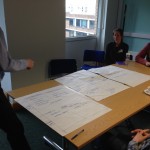Workshop on the dynamics of household energy demand during daily and network peaks; convened by Yolande Strengers (@YolandeStreng), Ben Anderson (@dataknut), and Mike Hazas (@MikeHazas)
On the 28-29 May the DEMAND Centre hosted a workshop at Lancaster University on changing household routines and the implications for managing (daily and network) peak demand, drawing on insights from Australian and UK research. The workshop brought together policy makers, demand managers and key thinkers on the time dynamics of energy demand. As well as exploring current analyses about how demand is shifting, and how it could be shifted, the workshop involved a series of ‘provocative experiments’ aimed at generating reflection on both current strategies and future visions of how daily and seasonal rhythms of energy demand can change.
Aims
Partially informed by the convenors’ close analyses of both UK and Australian household data, the workshop aimed to provoke reflection and discussion on:
- How and why energy-demanding routines are shifting in time and space, and the impacts of these changes on peak demand and CO2 emissions
- How demand managers are attempting to shift routines (and to what extent, and in what sense, this is (not) working)
- What other programs and policies might shift routines to reduce demand
We also designed a number of interventions to make some of these discussions more concrete. We hope the participants have now forgiven us…
Outputs
- Welcome, Scope and Introductions
- Framing the Problem – Ben Anderson
- Shifting routines, changing demand: Australian perspective – Yolande Strengers
- Sessions slides (with notes – large file) – includes information on interventions and a summary of the results plus images of the notes made on large sheets of paper during the group sessions (in order with captions)
- Electricity and data demand at the Workshop
Images of the interventions in play
- An off-grid solution
General workshop photos
Additional contributions
Participants (and non-participants) – please feel free to add materials, links, comments, feedback etc via comments below.










A number of people were interested in electric vehicles… The North East (CLNR project) work is reported here: http://www.networkrevolution.co.uk/industryzone/projectlibrary see especially “CLNR-L038 IEEE ISGT 2013: Integrating smart meter and electric vehicle charging data to predict distribution network impacts”
That project has also looked at microgen matching and also at Time of Use tariffs.
There’s also Low Carbon London http://www.lowcarbonlondonevproject.co.uk/ – not clear if any results are available yet and the same goes for http://myelectricavenue.info/ (but see http://myelectricavenue.info/project-deliverables)
These are all Low Carbon Network Fund projects carrying out fairly large scale/ambitious experiments and trials.
These are the ofgem working groups that are relevant:
https://www.ofgem.gov.uk/electricity/retail-market/forums-seminars-and-working-groups/smarter-markets-coordination-group (Smart Meters/Markets) and
https://www.ofgem.gov.uk/electricity/wholesale-market/forums-seminars-and-working-groups/demand-side-working-group (Demand Side Response – appears to be re-structuring itself at present)